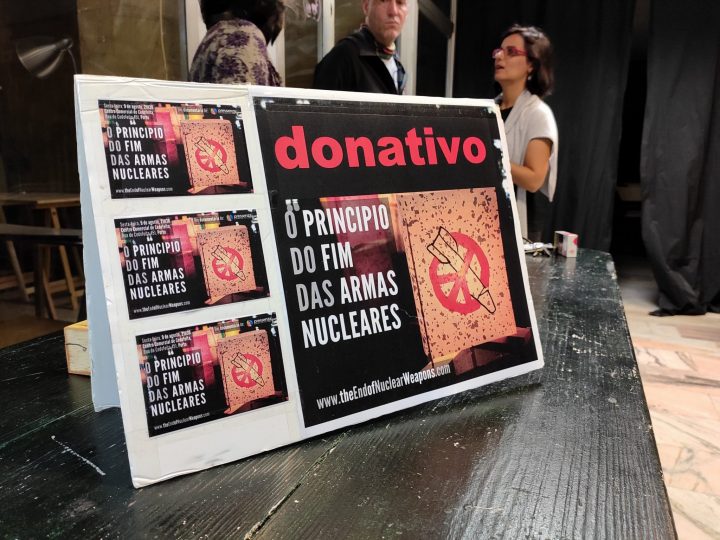On the 9th of August, precisely 74 years after the nuclear catastrophe in Nagasaki, the documentary “The beginning of the end of nuclear weapons” was shown in Porto, Portugal a city twinned with Nagasaki since 1978.
The documentary was produced by the Pressenza news agency and the event in Porto was co-organized by the organizations and communities that participate in the Minho Park of Studies and Reflection. The Cedofeita Shopping Centre hosted this initiative, which was attended by the Spanish director Álvaro Orús.
The documentary provides a historical account of the bomb and activism since the Second World War and leaves the audience with a certainty: the nuclear threat is not a thing of the past. There is a real danger that they will be launched intentionally or by accident, producing a terrible humanitarian disaster that would affect all of humanity.
Many world leaders never tire of irresponsibly using the argument of military power to discuss international affairs, preferring confrontation and threats as opposed to efforts for peace. Recently, the USA and Russia tore up the Intermediate Reach Nuclear Forces (INF) Treaty, signed by Ronald Reagan and Mikhail Gorbachev, in 1987.
Political confrontations and wars that continue to be fuelled in various countries today are not encouraging for world peace, but there are important efforts towards peace and disarmament that it is important to know about and promote.
Treaty on the Prohibition of Nuclear Weapons
The International Campaign to Abolish Nuclear Weapons, made up of organisations from many countries, received the Nobel Peace Prize in 2017 as a way of recognising their efforts to create an international treaty to ban the possession, use, manufacture and sale of nuclear weapons.
The Treaty on the Prohibition of Nuclear Weapons was adopted by the UN with the support of 122 countries and the vote against of 1 country. Nuclear-weapon states and NATO members did not participate in the vote. The Treaty is now open for signature and ratification by the different member states of the United Nations. For the treaty to be binding, civil society must speak out and governments must take the initiative to sign the treaty.
Nuclear weapons, can Portugal have a say?
Last year, a petition with more than 13,000 signatures was submitted to the Portuguese Parliament, recommending that the government sign the Nuclear Weapons Ban Treaty, an initiative of the Portuguese Council for Peace and Cooperation. Following this petition, the Assembly rejected the draft resolution by 4 parties: the Portuguese Communist Party, the Left Bloc, the Ecologist Party “The Greens” and People-Animals-Nature that recommended that the Portuguese government ratify the Treaty, with votes against coming from the Social Democratic Party, the Socialist Party and the Christian Democrats. With the approach of legislative elections, could there be a change in the way members of parliament vote, if this issue is taken back to parliament?
Several ideas arose in the conversation that ensued with the director of the documentary, in Porto: to work locally (with associations, universities, neighbourhood councils, schools, municipal councils) to raise awareness of peace and nonviolence and to pressure the Portuguese government to sign the Nuclear Weapons Ban Treaty.
Maria Vitor Mota
Parque de Estudo e Reflexão Minho
www.parqueminho.org






